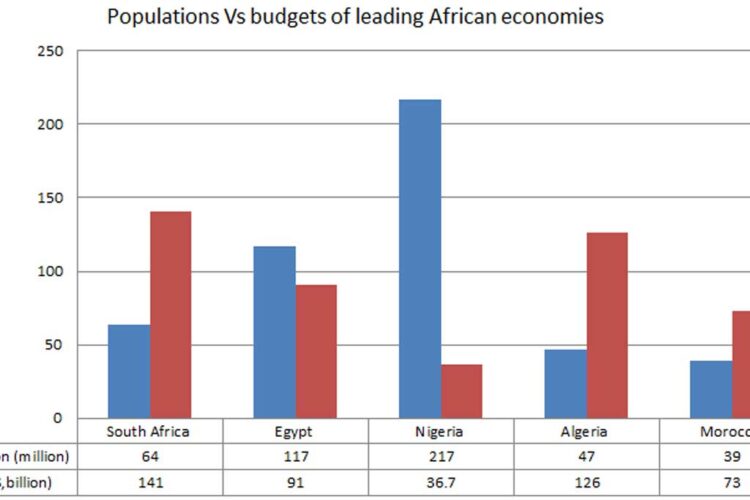
In a policy brief released yesterday, CPPE Director-General, Dr Muda Yusuf, said while recent policy measures have expanded fiscal space, rising inflation and currency depreciation have moderated the real value of these gains.
The think-tank’s analysis reveals a stark disparity in fiscal capacity across Africa’s major economies. South Africa’s budget stands at $141 billion, Algeria’s at $126 billion, Egypt’s at $91 billion and Morocco’s at $73 billion, all significantly outpacing Nigeria despite the country’s larger economy and population.
“Despite its large economy and population, Nigeria’s budget remains relatively small. This limits fiscal capacity for transformative investments in infrastructure, human capital, and social welfare,” the brief stated.
The CPPE acknowledged that two landmark policy measures the removal of fuel subsidy and the unification of exchange rates- have significantly boosted government revenues and improved the capacity for public investment.
Collections from value-added tax (VAT) and Company Income Tax (CIT) have also increased, reflecting stronger compliance and a gradual recovery in economic activities. State governments are reporting higher revenues and increased allocations to agriculture, infrastructure, and social development.
However, Dr. Yusuf cautioned that the real fiscal impact is tempered by high inflation and exchange rate pressures, emphasizing the importance of assessing fiscal outcomes in both nominal and real terms to maintain credible expectations and policy balance.
“The fuel subsidy removal freed trillions of naira in fiscal resources, while exchange rate unification boosted naira-denominated oil revenues. VAT and CIT collections improved through enhanced compliance and enforcement,” the policy brief explained.
The CPPE gave a measured assessment of recent tax policy reforms, identifying both positive features and areas of concern for the private sector.
The organisation commended reliefs for producers and priority sectors, higher exemption thresholds for low-income earners and small businesses, and zero-rated VAT on essential goods such as food, pharmaceuticals, and educational materials.
However, private sector concerns remain over compliance costs, the increase in capital gains tax from 10 percent to 30 percent, and possible welfare implications of personal income tax changes.
“Effective implementation should be guided by stakeholder consultation, flexibility, and evidence-based adjustments,” Yusuf recommended.
Addressing the proposed 5 percent fuel levy for road maintenance, the CPPE noted that while the measure has been legislated since 2007, it has never been implemented due to affordability and social concerns.
The organization acknowledged the clear fiscal rationale behind the levy but urged the government to consider economic conditions, timing, and social welfare implications to ensure broad acceptance and minimal disruption before activation.
With limited fiscal space, the CPPE stressed that spending efficiency is paramount, identifying five priority areas: infrastructure development including roads, power, ports, and digital infrastructure to reduce business costs; productivity support for manufacturing, MSMEs, and technology-driven enterprises; food security through investment in agriculture, storage, irrigation, and logistics; security enhancement; and human capital development through increased investment in health and education.
The policy brief urged governments at all levels to minimize waste, link spending to measurable outcomes, and comply strictly with fiscal responsibility benchmarks.
Yusuf also emphasized the pivotal role of state governments in national fiscal sustainability, noting that many have benefited from higher federal allocations and improved internally generated revenue (IGR).
“Aligning fiscal priorities with local economic needssupported by transparency and accountabilitywill promote balanced national development and reduce dependence on federal transfers,” he stated.
The CPPE’s six-point recommendation includes measuring fiscal gains realistically by adjusting for inflation and exchange rate effects; broadening and diversifying the revenue base; prioritizing high-impact spending; strengthening subnational fiscal capacity; implementing tax reforms with flexibility; and reinforcing fiscal discipline across all levels of government.
“With prudent management, stakeholder collaboration, and social sensitivity, these reforms can lay a solid foundation for a more resilient, productive, and inclusive Nigerian economy,” Yusuf concluded.
The policy brief comes amid ongoing national debates about the sustainability of recent fiscal reforms and their impact on businesses and ordinary Nigerians grappling with elevated living costs.
Comments
This site uses User Verification plugin to reduce spam. See how your comment data is processed.